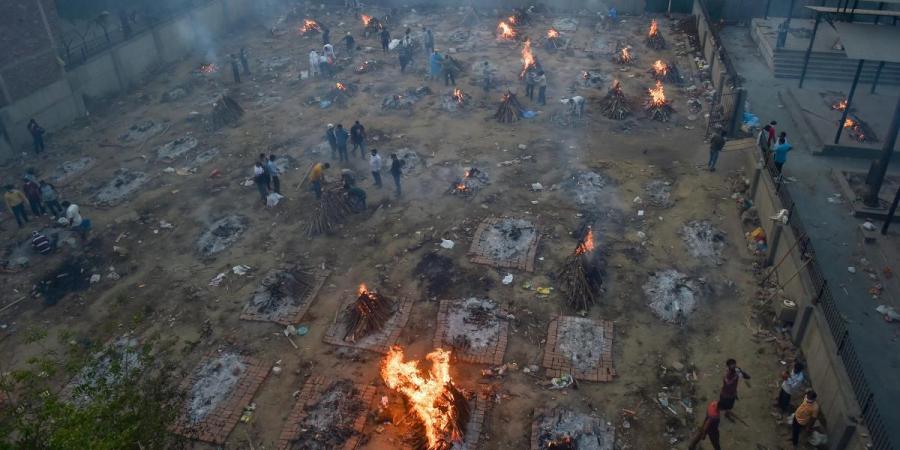
‘I feel like Yamraj’: Delhi’s frontline workers face unspeakable trauma
'From the very moment I pick up the phone to dial the number of a dead patient’s family, a feeling of despair takes over my mind and body'

As COVID-19 continues to ravage Delhi, front-line workers tasked with informing family members about the death of loved ones and cremating bodies are facing long-term anxiety and post-traumatic stress disorders. The Federal spoke to hospital staff, doctors and municipal workers who are performing duties that most people will seldom be called upon to perform, and the picture that emerges is one of despair and depression. Traumatised by their experiences, the workers say they have never witnessed such horrors before.
Several hospitals in the city have formed teams of medical staff to inform families about the death of their loved ones. It is a job that requires empathy and compassion.
Also read: Second COVID wave killed 270 Indian doctors, 50 died in single day: IMA
Komal Chatrana, a resident doctor at Hindu Rao Hospital in Delhi, administers the number of admitted, released and dead COVID-19 patients. “From the very moment I pick up the phone to dial the number of a dead patient’s family, a feeling of despair takes over my mind and body,” she told The Federal. “I feel like I am Yamraj [the Hindu god of death] for them. What will I say? How will I console them? These questions run around in my mind after every single death.”
“Till now I have informed more than 500 families about such deaths. Everyone reacts in a different way. Some are stunned, some start crying, some just go blank and don’t say anything. Sometimes I try to console them and sometimes I just cut the call to avoid further complications,” Komal added.
Komal said sometimes family members hold her responsible for their loved one’s death. “This is when I lose everything. This is not why I wanted to become a doctor. I wanted to become a doctor to help people. I wanted to treat people who don’t have money. I never wanted anyone to die because of me,” she said.
“The COVID facility in our hospital is situated in another block. Whenever I receive a call from that block, I get scared. These days, I can’t sleep properly at night. I don’t want to eat food. I am just depressed and scared. I just want this pandemic to end as soon as possible.”
While some people collect their family members’ bodies themselves, others refuse because of fear of COVID-19. They ask hospitals to perform the last rites. In such cases, Municipal Corporation of Delhi workers are called in.
Usually, the teams consist of cleaners and sanitation workers. The hospitals send the dead bodies to nearby cremation centres in ambulances and MCD workers perform their final rites.
Karam Pal, a sanitation worker in North MCD, has been cremating bodies for the past one month. He said he had performed the final rites for more than 700 people – fathers, mothers, sons, daughters… He starts at 6 in the morning and doesn’t stop until late at night.
“Some years ago, my mother died. I cremated her body in my village. I cried at the time. Now I have cremated more than 700 bodies in a month or two,” he told The Federal. “Whenever I cremate someone, I feel like I am cremating my mother. I get the same feeling. I cremate everyone like I cremated my mother. But the difference is that I am crying more now.”
“Despite working 14-15 hours a day, I can’t cremate all the bodies. The bodies keep coming. I clean the sewers and roads of Delhi. People call that a tough and dirty job. I plead with everyone to give me back my dirty job. I don’t want to do this anymore. I never wish to do something like this in all my life. I don’t know how I will forget this,” he said with tears in his eyes.
The Shaheed Bhagat Singh Sewa Dal (SBS), a voluntary organisation, has been providing free or discounted cremations for the poor for 25 years. The pandemic has stretched their capacity to the limit.
Jitender Singh Shunty is the founder of SBS. He received the Padma Shri earlier this year for his social work.
Over the years Shunty has seen many deaths, but the pandemic has taken a heavy toll on him. He and his volunteers have cremated more than 2,500 bodies in Delhi so far.
“I have never seen a catastrophe like this before,” Shunty said. “I have been living in Delhi for a long time. This is surely the worst period that I have lived through. There are dead bodies all around and people have abandoned them. Humanity has died, not just humans.”
In the past two decades SBS has cremated more than 15,000 bodies in Delhi. “Before the pandemic we, on average, cremated five bodies a day. In the first wave till March, we were cremating 36 bodies per day. Since April, we have been cremating 125 bodies per day. My volunteers and I sleep in ambulances these days. We give our days and nights, but the dead bodies are piled so high that we cannot cremate them all,” he added.
Shunty said the disaster had left “a stain on the soul of Delhi and Delhites”. “I am in a state of shock. I never imagined that Delhi, the capital city of India and home to the prime minister, the cabinet, judges from SC, HC, most VIPs, Delhi’s chief minister and his cabinet, will ever witness this. If our capital is burning like this, I can’t imagine what is happening in other parts of the country.”


